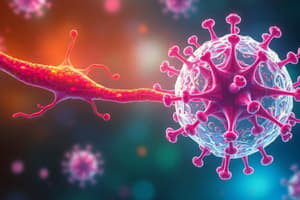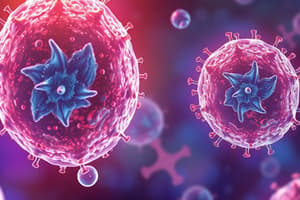Podcast
Questions and Answers
What is the role of Helper T Cells in adaptive immunity?
What is the role of Helper T Cells in adaptive immunity?
Helper T Cells help activate other immune system cells such as B cells.
How do Cytotoxic T Cells work in fighting infections?
How do Cytotoxic T Cells work in fighting infections?
Cytotoxic T Cells kill infected host cells by injecting toxic proteins into the cell.
What is the function of Regulatory T Cells in the immune system?
What is the function of Regulatory T Cells in the immune system?
Regulatory T Cells regulate responses from helper T cells during an immune response.
In which type of immunity do antibodies circulate in body fluids?
In which type of immunity do antibodies circulate in body fluids?
How do antibodies contribute to immunity against specific invading organisms?
How do antibodies contribute to immunity against specific invading organisms?
What is the process called by which the adaptive immune system remembers previous encounters with pathogens?
What is the process called by which the adaptive immune system remembers previous encounters with pathogens?
Which cells play a crucial role in presenting antigens to lymphocytes for proper immune response activation?
Which cells play a crucial role in presenting antigens to lymphocytes for proper immune response activation?
What happens to lymphocytes once they are activated by encountering antigen-presenting cells?
What happens to lymphocytes once they are activated by encountering antigen-presenting cells?
How does the recognition of foreign particles through antigen presentation contribute to developing immunity in the adaptive immune system?
How does the recognition of foreign particles through antigen presentation contribute to developing immunity in the adaptive immune system?
Explain the significance of the adaptive immune system's reliance on specialized cells and processes in defending the body from pathogens.
Explain the significance of the adaptive immune system's reliance on specialized cells and processes in defending the body from pathogens.
Flashcards are hidden until you start studying
Study Notes
Adaptive immunity is one of the two primary components of the human immune system, along with innate immunity. It involves specialized white blood cells called lymphocytes which have the ability to recognize specific foreign molecules known as antigens. This process allows our bodies to build immunity against pathogens it has previously encountered. There are several aspects within adaptive immunity that contribute to its effectiveness in protecting us from infection and disease:
T Cells
T cells (also known as T lymphocytes) are another type of lymphocyte specifically involved in cellular immunity. They play multiple roles in adaptive immunity including:
- Helper T Cells: These help activate other immune system cells such as B cells.
- Cytotoxic T Cells: These kill infected host cells by binding themselves to them via their surface protein receptors, injecting toxic proteins into the cell, causing it to die.
- Regulatory T Cells: These regulate responses from helper T cells during an immune response.
Antibodies
Antibodies are produced by plasma cells and are part of humoral immunity, meaning they circulate in body fluids like blood or lymph. Each antibody can bind to a particular antigen, allowing for recognition of specific invading organisms when the antibodies are present. For instance, if you've had chickenpox before, your body will produce antibodies to deal with any future encounters with the virus responsible for this illness.
Immunological Memory
The adaptive immune system remembers previous encounters with pathogenic agents through a process known as 'immunological memory'. When a new challenge occurs, the immune system quickly recognizes the threat because the old and new invaders share common parts. As a result, your immune system responds more rapidly and effectively upon subsequent exposure to these pathogens.
Antigen Presentation
This refers to how antigens are presented to lymphocytes so they can detect and respond appropriately to foreign materials. A key component of antigen presenting cells includes dendritic cells found throughout the tissues of the body. Lymphocytes can be activated only after encountering antigen-presenting cells. Once activated, the lymphocytes clone themselves to make many identical copies, ensuring a rapid response to eliminate the foreign material or pathogen.
In summary, the adaptive immune system relies on various types of specialized cells and processes to address threats to our health. Recognition of foreign particles through 'antigen presentation', followed by activation and cloning of lymphocytes, ensures we develop immunity and defend ourselves efficiently from invaders.
Studying That Suits You
Use AI to generate personalized quizzes and flashcards to suit your learning preferences.




